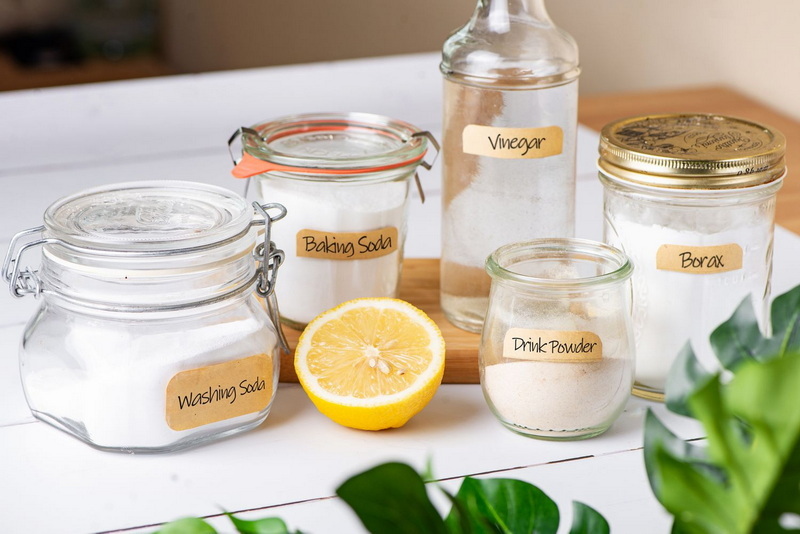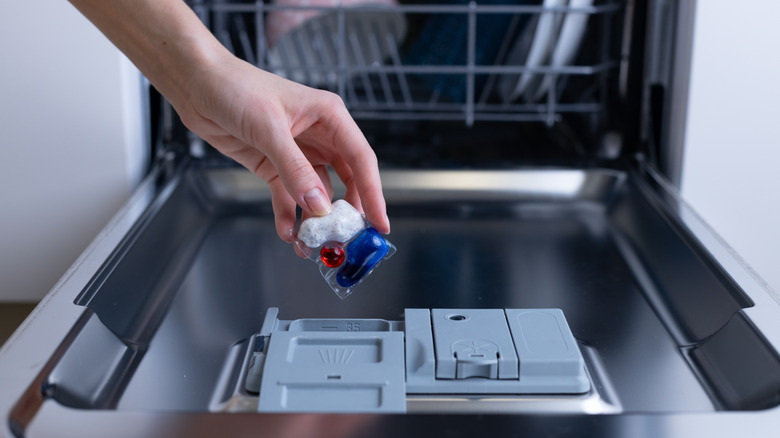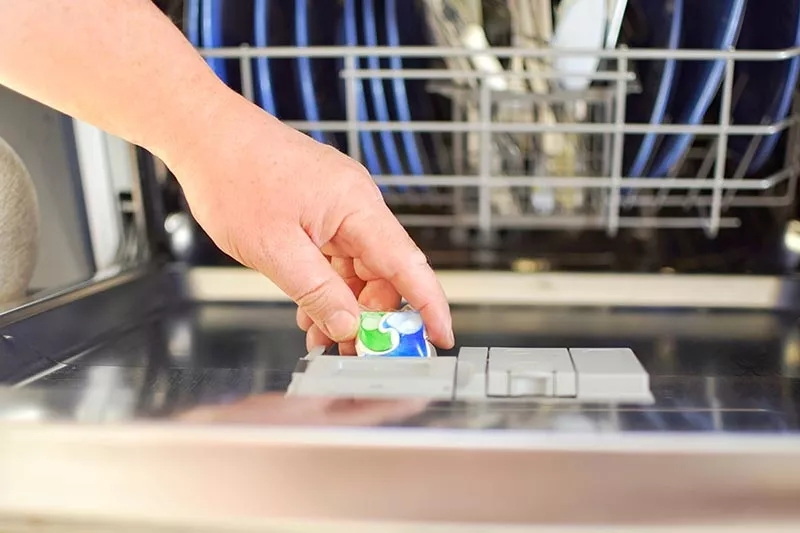Dongguan UFine Daily Chemical Co.,Ltd.
- All
- Product Name
- Product Keyword
- Product Model
- Product Summary
- Product Description
- Multi Field Search
Views: 222 Author: Tomorrow Publish Time: 10-15-2025 Origin: Site











Content Menu
● Understanding Dishwasher Pods and Their Alternatives
● Common Alternatives to Dishwasher Pods
>> 1. Powdered Dishwasher Detergents
>> 2. Dishwasher Gel Detergents
>> 3. Baking Soda and Washing Soda Mixture
>> 4. White Vinegar as Rinse Aid or Booster
● How to Make Homemade Dishwasher Detergent
>> Basic Recipe
● Additional Homemade Booster for Stubborn Stains
● Tips for Using Alternatives Effectively
>> Use Vinegar for Spot-Free Dishes
>> Regular Dishwasher Cleaning
● When to Avoid Certain Alternatives
● Choosing the Best Alternative for Your Needs
● FAQ
>> 1. Can I use baking soda alone to replace dishwasher pods?
>> 2. Is white vinegar safe to use in my dishwasher?
>> 3. How much homemade detergent should I use per load?
>> 4. Can I use dish soap instead of dishwasher pods?
>> 5. How do I keep my dishwasher clean without using pods?
Dishwasher pods have become a popular choice for cleaning dishes due to their convenience and pre-measured formula. However, many people look for alternatives to pods for various reasons, including cost efficiency, ingredient preferences, or environmental concerns. If you find yourself asking, "What can I use in dishwasher instead of pods?" this article will guide you through effective and safe alternatives, practical homemade recipes, and tips for maintaining dishwasher performance. This comprehensive guide will help you make informed decisions to achieve clean, sparkling dishes without pods.

Dishwasher pods typically contain a blend of detergents, enzymes, and additives designed to remove food residues and grease effectively. While convenient, pods can be expensive and sometimes contain chemicals that users prefer to avoid. To replace pods, it's important to use substances that can break down grease, soften water, and lift stains without damaging your machine or dishes.
Powder detergents are widely available and often less expensive than pods. They feature formulas similar to pods but allow you to adjust the quantity per load, which can save money. They dissolve well when added directly to the detergent compartment and have a long shelf life.
Powdered detergents work well in various water types and can be boosted with additives for hard water conditions. Some powders contain enzymes that break down tough proteins and starches effectively.
Gel detergents are liquid and provide good grease-cutting properties. They are easy to pour and often designed to work in hard or soft water. Gels allow dosage control and can be a good replacement for pods if you want a liquid formula.
The downside to gels is that they may not be as effective on dried or baked-on food residues compared to powders or pods. However, gels are often preferred by those concerned about chemical residue because they tend to rinse away cleanly.
A homemade option combining baking soda (sodium bicarbonate) and washing soda (sodium carbonate) offers scrubbing and grease-cutting power. Baking soda deodorizes and softens water slightly, while washing soda adds cleaning strength.
This mixture is beneficial when combined with a rinse aid like vinegar, which helps prevent spots and film on dishes. Both baking soda and washing soda are inexpensive and widely available, making this a popular DIY choice.
White vinegar is an excellent natural rinse aid to help remove spots and residue. Though it does not clean grime by itself, combining vinegar with a baking soda mixture can enhance cleaning. Use vinegar in the rinse aid compartment, never directly with detergent.
Vinegar helps dissolve mineral buildup from hard water, making glassware and silverware shine. It also neutralizes odors inside the dishwasher.
A few drops of liquid castile soap mixed into a baking soda base provide gentle cleaning without harsh chemicals. Be cautious as excessive suds can impact dishwasher performance. Castile soap is plant-based, biodegradable, and often preferred by those seeking an eco-friendly cleaning option.
To prevent sudsing issues, use this combination sparingly and never pour liquid soap directly into the dishwasher without other ingredients.
To answer, “What can I use in dishwasher instead of pods?” homemade dishwasher detergent offers an eco-friendly and budget-friendly solution.
- 1 cup washing soda
- 1 cup baking soda
- ½ cup citric acid (for stain removal)
- ½ cup coarse salt (to soften water)
1. Combine all ingredients thoroughly.
2. Store the mixture in an airtight container to prevent moisture exposure.
3. Use 1-2 tablespoons per dishwasher load.
This blend effectively removes grease, softens water, and controls mineral buildup. Citric acid works as a natural descaling agent to combat hard water spots and stains.
- A few drops of essential oils (e.g., lemon or tea tree) for fragrance and antibacterial properties.
- A tablespoon of borax for extra cleaning power (use carefully and out of reach from children).

If dishes have baked-on food or stains, try this rinse booster:
- 1 cup white vinegar
- 1 tablespoon baking soda
Sprinkle some baking soda directly on heavily soiled plates before washing, then use vinegar in the rinse aid compartment.
Using too much homemade detergent can lead to residue on dishes or inside the dishwasher. Start with a small amount and adjust as needed.
Removing large food particles before loading dishes improves cleaning results. This can also prevent clogs in the dishwasher filter.
Add 1 cup of white vinegar to the rinse aid compartment to reduce spotting and film on glassware.
Run an empty cycle monthly with white vinegar or a dishwasher cleaner to remove buildup. This prevents odors and keeps the machine in good condition.
Water hardness affects detergent performance. If your water is very hard, use a water softener or add more washing soda to homemade detergent recipes.
Avoid Mixing Vinegar with Detergent
Never mix white vinegar directly with dishwasher detergent inside the machine as it can cause a chemical reaction that reduces cleaning efficiency.
- Avoid using regular dish soap (dishwashing liquid) in the dishwasher as it creates excessive suds that can damage the appliance.
- Avoid using bleach or harsh chemicals that are not intended for dishwashers, as they may corrode parts or affect dish integrity.
- Homemade detergent may not perform as well as commercial products in very hard water conditions unless you use a water softening additive.
- Be cautious using lemon juice directly in the dishwasher as high acidity may damage rubber seals over time.
The choice between powdered detergents, gels, and homemade options depends on preferences like cost, environmental impact, and sensitivity to chemicals. Commercial powders are reliable and easy to use but may contain phosphates or additives. Gels offer convenience and reduced residue. Homemade mixtures shine in eco-friendliness and affordability but may require some experimentation to perfect.
If you want to replace dishwasher pods, several effective alternatives exist—from commercial gels and powders to homemade detergent recipes. Using baking soda, washing soda, and white vinegar offers an environmentally friendly, cost-effective option. Always tailor the amounts to your dishwasher's instructions and your water hardness. With proper use, you can enjoy spotless, clean dishes without relying on pods.

Baking soda can aid cleaning and deodorize but is not strong enough alone to fully replace pods. It works best combined with washing soda or other additives.
Yes, white vinegar is safe when used as a rinse aid but should not be mixed directly with dishwasher detergent.
Start with 1 to 2 tablespoons; adjust if you notice residue or insufficient cleaning.
No, dish soap creates excessive suds that can damage your dishwasher.
Run monthly maintenance cycles using white vinegar or specific dishwasher cleaners to remove buildup.